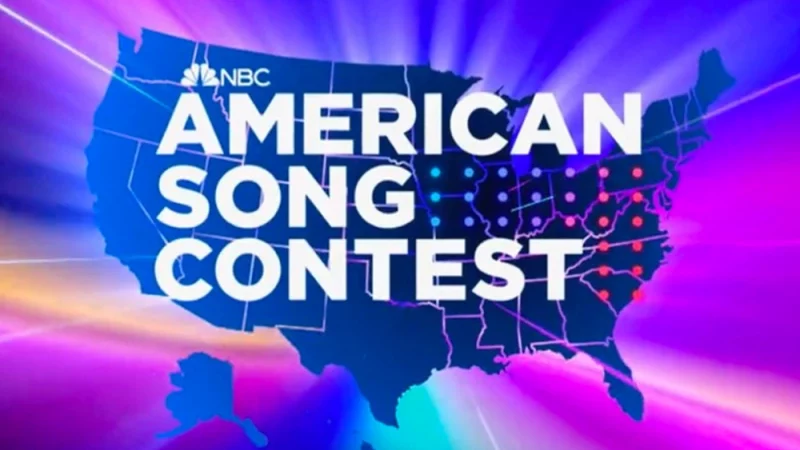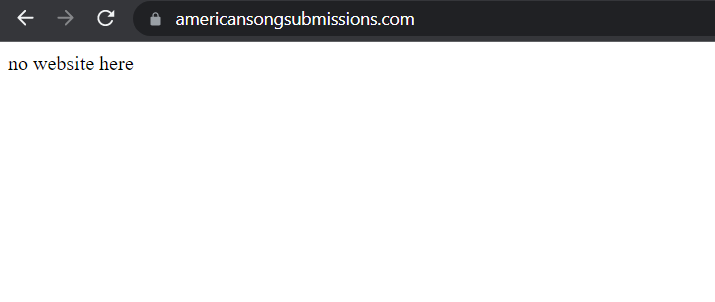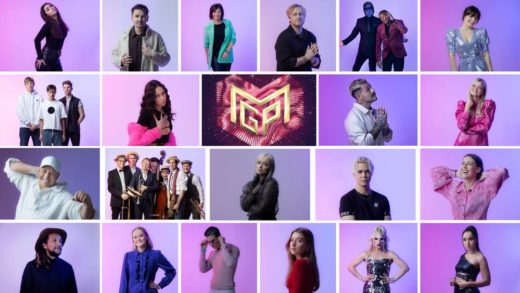Fixing the American Song Contest

The American Song Contest is back! Or is it??? I started writing this post on November 6, a day after EurovisionFun broke the news about the American Song Contest website taking season two submissions. I even took the step of registering as a performer on the ASC website so I could see the eligibility requirements. That website is now gone. Did it get canceled? Have they closed submissions? According to TVSeriesFinale, we’re still in Schrödinger’s Renewal Box where a show is both not canceled and canceled. Either way, I spent too much time thinking about the future of ASC and writing this post, so canceled or not, I’m still posting it. Here are my thoughts on how the American Song Contest (if it isn’t canceled) can be improved for longevity.
In early 2022 I made the conscious decision to understand the cultural phenomenon that is the Eurovision Song Contest. You can read about that journey in my post: So I Have a Eurovision Song Contest Spreadsheet. I don’t spend much time watching popular television shows like The Masked Singer or American Idol (is that still a thing?). Additionally, I’m not typically interested in U.S. pop music (this may be surprising considering my current obsession with Eurovision). At this moment, I couldn’t tell you who’s number one on the charts, but my guess would be Taylor Swift. She seems like a safe answer to such a trivia question.
My top five most listened-to artists on Tidal for the month of October were:
- Swans
- Pixies
- Kikagaku Moyo
- Hans Zimmer
- Zeal and Ardor
If I hadn’t made my Eurovision decision there’s a decent chance I never would have known 2022 saw the United States music industry Powers That Be attempt to launch a Eurovision clone called the American Song Contest. I remember when I first came across the ASC. It was April and I was deep into building my first Eurovision spreadsheet. The qualifiers were coming to an end and the semi-finalists were falling into place. I was deeply annoyed because it forced me to ask the question “if I’m going to be serious about Eurovision does that mean that I, as a United States citizen, need to also take the American Song Contest seriously?” I decided no. My goal was to understand and enjoy Eurovision. Based on what I was reading online ASC wasn’t doing well and probably wouldn’t be renewed for a second season. It didn’t seem like a worthwhile time investment. I decided to betray my home country by pretending the ASC didn’t exist and stick with my new friends in Europe (and Australia).
If you read my initial Eurovision blog you’ll know the European contest managed to get its hooks into me. I believe it would be fair to say that while I’m not exactly a fan – I am an active spectator. I follow some of the 2022 artists, track when the 2023 country contests will occur, and research how I could possibly make a trip to one of those events (Finland is top of my list) or Eurovision 2023. My brain had decided to commit to the Eurovision bit for another year.
I’ve been casually putting together a 2023 Eurovision spreadsheet over the last couple of months. As the year crept forward and there wasn’t an announcement about the ASC I grew more confident I wouldn’t need to worry about it. All of those opinions I’d formed about how it was produced and rolled out could be put to rest. That changed on November 5 when NBC opened submissions for the second season of the American Song Contest. With a long sigh, I realized if I was going all in on Eurovision 2023 it would only be fair to pay attention to the song contest unfurling in my backyard.
Although I’m about to be critical of the American Song Contest I’d like to stress it comes from a desire to see it succeed. The ASC has several unique challenges it needs to overcome if it sincerely wishes to be an annual beloved event on the scale of Eurovision. I have no doubt the producers are aware of these challenges. I have a number of recommendations but for the purpose of this post, I decided to focus on what I see as the two most important. These recommendations are based on Wikipedia’s explanation for the ASC process. They also don’t reflect any changes that might be announced for season two.
Expand the solicitation process
Eurovision is a country-based song contest which gives it one huge artist selection advantage over the American Song Contest. Each European country has a public broadcasting network that manages its selection process. It’s complicated, but at the basic level most of these networks are state-owned (for example, Spain’s Radiotelevisión Española) or at the least operates by a form of government charter (for example, the UK’s BBC operates by royal charter). They often manage broadcasting for radio and television programming.
Those country-specific broadcasting bodies, often with the assistance of a music management or publishing company, will determine the selection process. This can be through a televised national selection competition, an internal process, or a combination. In 2022, the BBC teamed up with TaP Music to internally select Sam Ryder. In contrast, Spain’s Radiotelevisión Española went whole hog and put on an entire music festival called Benidorm Festival to select Chanel through a combined jury and public televote (sort of, there was some controversy which, honestly, is one of the fun things about Eurovision).
This format would be difficult in the United States due to differences between our public broadcasting model and the common European public broadcasting model. It’s complicated to explain without writing a college thesis, but in the shortest most simplified explanation: Few people are going to a U.S. state’s National Public Radio station or Public Broadcasting Service channel to learn about exciting new music. There are exceptions, like Minnesota Public Radio’s The Current, but that’s a rarity. However, in most major listening radio regions the NPR partner stations aren’t broadcasting all that much in terms of music that isn’t classical, bluegrass, or folk.
That leaves us with conglomerates. In most major radio markets listeners are likely to discover new music through one of the three major conglomerates: IHeartMedia, Audacy, or Cumulus. And in those cases, it’s rare listeners will be exposed to local artists who haven’t already broken out. In the United States, exposure to local music simply isn’t a thing we prioritize on the airwaves.
In 2022, the American Song Contest, which is licensed by NBC for television broadcasting, chose IHeartMedia as the radio partner.
There isn’t a great deal of regional spirit in the current song selection process. There’s a single portal where anyone can submit a new, unreleased and original song. When an artist fills out a profile in the portal they’re asked “where do you currently live?” and “where are you ‘from’”? “From” can be a place where you’ve lived and strongly identify with as part of your roots. For example, Jewel (yes, that Jewel) currently lives in Utah, but she identifies with growing up in Alaska, so that’s where she’s “from.”
This distinction is important because that’s how the producers might determine the state you’ll represent. Yes, you read that correctly. The producers of the shows review the submissions and make the decision as to which artist will represent each state. There wasn’t a committee in the State of Connecticut deciding Michael Bolton was the best option for the American Song Contest. It was a committee of producers.
This process makes sense for the early seasons of the show, but the only way the American Song Contest will truly grow and become a cultural institution is through collaboration with states interested in participating.
Enter: Wisconsin Song Contest
I know the Wisconsin music scene better than most other states, so I’m using it as my example.
Wisconsin has several non-profit organizations focused on supporting regional music scenes. One that comes to mind is the Madison Area Music Association which, in addition to putting instruments in the hands of kids, hosts an annual awards ceremony for the Madison music scene. Another is the Wisconsin Area Music Industry which has the mission to “educate and recognize the achievements and accomplishments of individuals in the Wisconsin music industry.”
Outside of these non-profit, volunteer organizations, there are a handful of “regional” promotion companies that have an understanding of the regional music scene. Personally, I shudder when I hear the words “Live Nation” and “Ticketmaster,” but for the purpose of this experiment, I’m letting go of my biases. Live Nation owns subsidiaries and partner organizations all across the country. In Wisconsin, they’re the parent company of Madison’s Frank Productions which in turn owns and manages several music venues in Madison (The Sylvie, Majestic, High Noon Saloon). In the long term, it could make sense to partner with such an organization, but not right away.
The Wisconsin Song Contest needs to kick off as part of an event that people are already attending. Enter: Summerfest. Summerfest is a historic nearly two-week-long music festival in Milwaukee. It’s been in operation for more than 50 years. It attracts nearly 800,000 attendees every year. The American Song Contest would highly benefit from exposure through the Wisconsin Song Contest at Summerfest. Possibly the Wisconsin Song Contest committee selects 10 artists from around the state. Those artists compete in an online streamed competition hosted at Summerfest. To help make the event compelling to the average person not familiar with Eurovision, in the first year the acts are reinforced with performances from Wisconsin artists like Bon Iver, Violent Femmes, Eric Benét, or Garbage.
As a bonus, there could be one app to rule them all. Currently, ASC voting happens through NBC’s app. I get it. They’re footing most of the production bill, so they should get the bounty of new profiles, but in the long run, it would be a benefit to spin off a ASC-specific app. If a state chooses to host a song contest that voting could, for a nominal fee, also be managed through the ASC app. This way you’re getting all of these people who are invested in the Wisconsin Song Contest signed up months before the American Song Contest. Lead generation!
I’m certain this format can be replicated throughout the country. In California, the American Song Contest could partner with Another Planet Entertainment or AEG Presents (why not both?). In Texas, South by Southwest or Austin City Limits seem like obvious options. Connecticut, if they actually want to get away from Michael Bolton, Powder Ridge Mountain has a popular summer music series that could slot in a Connecticut Song Contest.
One of the problems with most of my suggestions is the American Song Contest is currently aligned to broadcast around the same time as Eurovision. My proposal has ASC tying its star to spring and summer music events. ASC would need to move to the fall broadcasting calendar. This makes sense for the second part of my recommendation: The hype.
The hype is backward.
Currently, if a performer wins the entire American Song Contest kit and caboodle IHeartRadio will bless that artist by playing their song on IHeartRadio stations “all summer long.” That prize is so condescending. I could write dozens of think pieces on why that cuts to the “heart” of how messed up the gatekeeping of popular music is in the United States, but I’m putting it in a box with LiveNation and Ticketmaster. Deep breath.
If the intention is to build excitement and popular support for the American Song Contest all of the competitors should be distributed to local IHeartRadio stations. If we were doing 2022 over then ASC should have sent Ryan Charles’ “New Boot Goofin’” to Wyoming’s KOLT 100.7 one month before the season started. Michael Bolton’s “Beautiful World” should have been on Connecticut’s KISS 95.7.
And the big prize? Airplay isn’t enough. The big prize should be an appearance at Eurovision. AleXa should perform at Eurovision 2023. And vice-versa. Eurovision should have Kalush Orchestra perform on the American Song Contest. Even better, have a different top 2022 Eurovision performer on the American Song Contest each week. Help build awareness of our European cousins. UK’s Sam Ryder and Spain’s Chanel are obvious choices for the masses but how wild would it be to see Serbia’s Konstrakta or Norway’s Subwoolfer on NBC? It will help tighten that cross-Atlantic connection and generate intercontinental interest in both shows.
In closing, those are my big two recommendations.
- Involve states in the artist selection process either through a state committee or a song contest. Thereby, strengthening state spirit in the eventual selectee. Dump the Hollywood committee.
- Build hype in advance. Give the competitors regional airplay one month ahead of the contest.



So Very Social